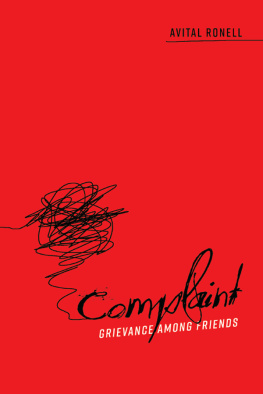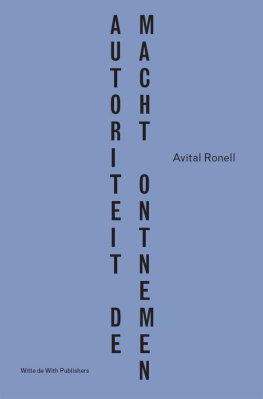Ronell - Complaint grievance among friends
Here you can read online Ronell - Complaint grievance among friends full text of the book (entire story) in english for free. Download pdf and epub, get meaning, cover and reviews about this ebook. City: Urbana Chicago Springfield, year: 2018, publisher: University of Illinois Press, genre: Romance novel. Description of the work, (preface) as well as reviews are available. Best literature library LitArk.com created for fans of good reading and offers a wide selection of genres:
Romance novel
Science fiction
Adventure
Detective
Science
History
Home and family
Prose
Art
Politics
Computer
Non-fiction
Religion
Business
Children
Humor
Choose a favorite category and find really read worthwhile books. Enjoy immersion in the world of imagination, feel the emotions of the characters or learn something new for yourself, make an fascinating discovery.
- Book:Complaint grievance among friends
- Author:
- Publisher:University of Illinois Press
- Genre:
- Year:2018
- City:Urbana Chicago Springfield
- Rating:5 / 5
- Favourites:Add to favourites
- Your mark:
- 100
- 1
- 2
- 3
- 4
- 5
Complaint grievance among friends: summary, description and annotation
We offer to read an annotation, description, summary or preface (depends on what the author of the book "Complaint grievance among friends" wrote himself). If you haven't found the necessary information about the book — write in the comments, we will try to find it.
Ronell: author's other books
Who wrote Complaint grievance among friends? Find out the surname, the name of the author of the book and a list of all author's works by series.
Complaint grievance among friends — read online for free the complete book (whole text) full work
Below is the text of the book, divided by pages. System saving the place of the last page read, allows you to conveniently read the book "Complaint grievance among friends" online for free, without having to search again every time where you left off. Put a bookmark, and you can go to the page where you finished reading at any time.
Font size:
Interval:
Bookmark:
AVITAL RONELL is University Professor of the Humanities at New York University, where she is Professor of German, Comparative Literature, and English. She holds the Jacques Derrida Chair of Media and Philosophy at the European Graduate School. Her books include The Telephone Book, Stupidity, The Test Drive, and Fighting Theory (with Anne Dufourmantelle).

The Complaint of Modernity
Hamlet Stalked. Philosophy has a bid on complaint structures, and literature keeps itself riled up, fed by the alternate motivators of rage and constraint. The complaint has swarmed all sorts of discursive fields and referential sectors of vital encounter, depleting or, in some instances, accommodating the way things fall in place, line up, to facilitate or block existential pathways and psychic runs.
Our social networks are saturated with complaint, increasingly dependent on its reach and ability to sustain a semblance of relatedness. Instructed by Derridean indicators, let us keep tuned to the culture of litigation, grievance, and complaint in legal and medical tracking systems and triggers. Derrida did not teach us a method as such but sensitized his students to Nietzschean transvaluating machines in order to tag the programs, often contradictory and aporetic, that control our appropriationsthe way they stick, like the spirit of Christianity, or falter, like the spirit of Christianity. Or, to put it somewhat differently, he keyed us into la disjointure, the out-of-jointedness instructed by Hamlet as he sets his complaining machine in gear.
Disjointure opens the relation to what has been concealed. It may resemble what Heidegger says in the context of technological dominion about breakdown: the essence of technology, he observes, is disclosed in its breakdown. About to teach that very passage, one day on the Bay Bridge en route to Berkeley, I caught a glimpse of the essence of my car when it broke down. I tended to the stalled vehicle with disclosive anxiety when, precisely, it stopped working, leaving me stranded on a bridge to nowhere. I was deep in ontology, staring down the unfairness of it all, checking my watch. I called upon my fathers spirit, as I do in times of trouble, to pull me out of the existential-mechanical ditch. My attention turned to a litany of woes, the sheer stuckness of being: my stupid life. Alone on the bridge. Its really not fair, none of it. Hamlet, equally stalled by whatever drives him, possibly even to a more ontological-legal effect,
In Specters of Marx, Derrida raises the visor, asking, How to distinguish between two disadjustments, between the disjuncture of the unjust and the one that opens the infinite dissymetry of the relation to the other, that is to say, the place of justice? As Heidegger reminds us regarding a passage in the Anaximander fragment, the Greek adikia means not only injustice, but also being-out-of-joint (aus den Fugen sein). Heideggers commentary of the Fragment drives a conciliatory movement of accord, the assumption of a rejoining and regathering, a communitary suture that Derridas positions confront. The complaint of Hamlet, the fragmenting disturbance of Anaximander, cannot resolve into an erasure of diffrance accomplished by summoning tropes of plenitude. Heideggers report on the derailment over which Anaximander grieves and Hamlet complains tries to take the edge off and envisage a way for being to get back on track. The complaint doubles down on the riot of injustice strapped to the very fact of beingthat our days are borrowed, that language lashes out arbitrarily, grievously misfires intention, dowses meaning, outsources feeling to remote and approximate fields of saying, sideswiping the aims of lament, downsizing the house of praisehinging the advent of evil on the demand for justice.
Hamlet, attached to languageIt speaks!human all too inhuman, work? Often latched on to the work of mourning, the functioning of man, like the work of mourning, according to Derrida, does not work. Nowadays we continue to say, when downscaling, Shes a piece of work!, indicating trouble and a coded history of difficult behaviors.
The Plaint of Flouted Sovereignty . A designated passageway to modernity, Hamlet has been viewed as fashioning the first full-fleshed modern man. The range of his world-class anxiety discloses depths and a hint of interiority that Hamlets predecessors could not know. Yet the metaphor of depth puts tragic language on furlough, no matter how substantial and rhetorically wrought each expression of doubt, unmanageability, and outrage can be. Hamlet staggers and stalls over the demeaned form of language usage with which he, ever a loser son, is saddled. The many times that he lets his sentinels or even the great friend, Horatio, step ahead of him or walk with him, stage a level of hierarchical breakdown unheard of, giving way to a stunning if silent strike out of royal protocols of convened criture and gestural syntax. When everything is relegated to Horatios notational skills, we learn that the bestie may not be the best of memorializers, may not be the best man for the job. Hamlet addresses the testamentary task to a so-so writer.
How does the tragic adherence to the complaint implicate man, and what does it tell us about the stalls and neutralizing tendencies of acts (or passivities) of complaining? How does the complaint struggle for legitimacy in the rhetorical bid for power? Or are the thrusts of complaining just the necessary cohort to powerlessness, capable only of showcasing the illegitimate lunges made at referential authority and what it means consistently to fall flat on the face of linguistic positing feints? The complaint bickers constantly with its stated insufficiencies, the limits it hits with regard to reach and intention. Proffering only the spectacle of a failed bid for its own authority, the complaint incorporates its flailing dumb show as it tries to subdue its recalcitrant auditor.
Its touch and go in Hamlet, for the plaint that triggers the dumb show hits home, suffices to catch the conscience of the King, sending Uncle Claudius reeling and kneeling like no other language form of attack. To the extent that charging with language can be at all gendereda contestable but inescapable temptation of comprehension and argumentthus failing the test of maintaining even a hint of manliness in the making of claims and executing turnarounds, the plaintive bout is not only the destitute cousin to all language, coming from the wrong side of the referential tracks, but says something about the plight of those beings that take recourse to language and lose ground, fight it out time and again with only paltry results and powered-down amplifiers.
Hamlet puts into gear a drama of flouted sovereignty, for the throne of Denmark has been seized illegitimately, by intimate usurpation. That the power grab extends inextricably to Gertrude tightens the knot of sovereign assumption and desire. Dethroned, the ghost can only rattle his son, who in turn can only rattle his chains, locked into a signifying chain that allows for little latitude. Fogged in and frozen in place, Hamlet constructs the precarious edifice of his complaints. There are moments when he breaks loose from his peculiar confinement, when he lunges at Polonius and arranges for the execution of his friends as part of a demonstration of rage misfiring, going after a secondary tangent.
The complaint as premier attributeas zero stage of linguistic throwdownoffers up a sense of man in relation to the decline of sovereignty. No sovereign, no pose of subjective mastery, would be caught dead complaining! Or, more to the ghostly point, the sovereign must be dead in order to complain. The supreme complainer, Hamlets ghost attracts doubt to the veracity of his claims, inspires his interlocutor to pull in, to suspend action if not belief. Both Hamlets strain the terms of their suspension, in air and as heir. All possibility for dramatically conceived action famously hangs fire. Hamlet cannot target a first responder, someone who would be roused to vengeance by a readably convincing war cry. What gets transmitted is not so much an order, a perlocutionary speech act, but the suspensive stance, occupied by the phantom utterance, of the supreme complainerthe dead paternal trope. Fathers are not supposed to complain; mothers, well, this is another story, currently under investigation, for mothers can go at it: they do not commonly risk in terms of language games the threat of castration and no one really cares about their gripe, the on-switch of an inconsequential cannonade of nagging. Sometimes, however, they are pushed to murderous extremes in order to lodge a complaint, make it take hold in view of an entire, horror-stricken community of onlookers, the so-called innocent bystanders who have, to some degree or another, let it come to this.
Font size:
Interval:
Bookmark:
Similar books «Complaint grievance among friends»
Look at similar books to Complaint grievance among friends. We have selected literature similar in name and meaning in the hope of providing readers with more options to find new, interesting, not yet read works.
Discussion, reviews of the book Complaint grievance among friends and just readers' own opinions. Leave your comments, write what you think about the work, its meaning or the main characters. Specify what exactly you liked and what you didn't like, and why you think so.








